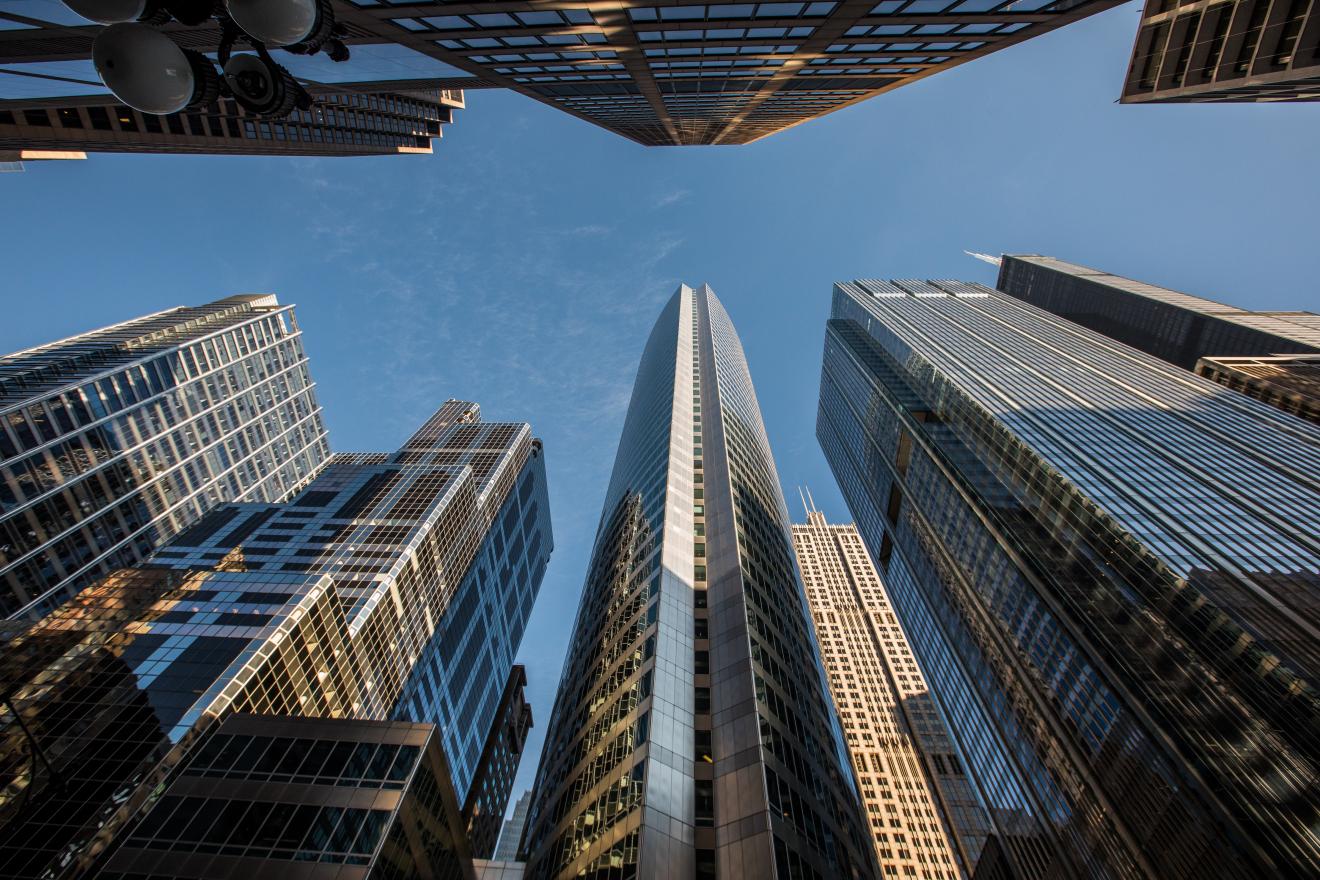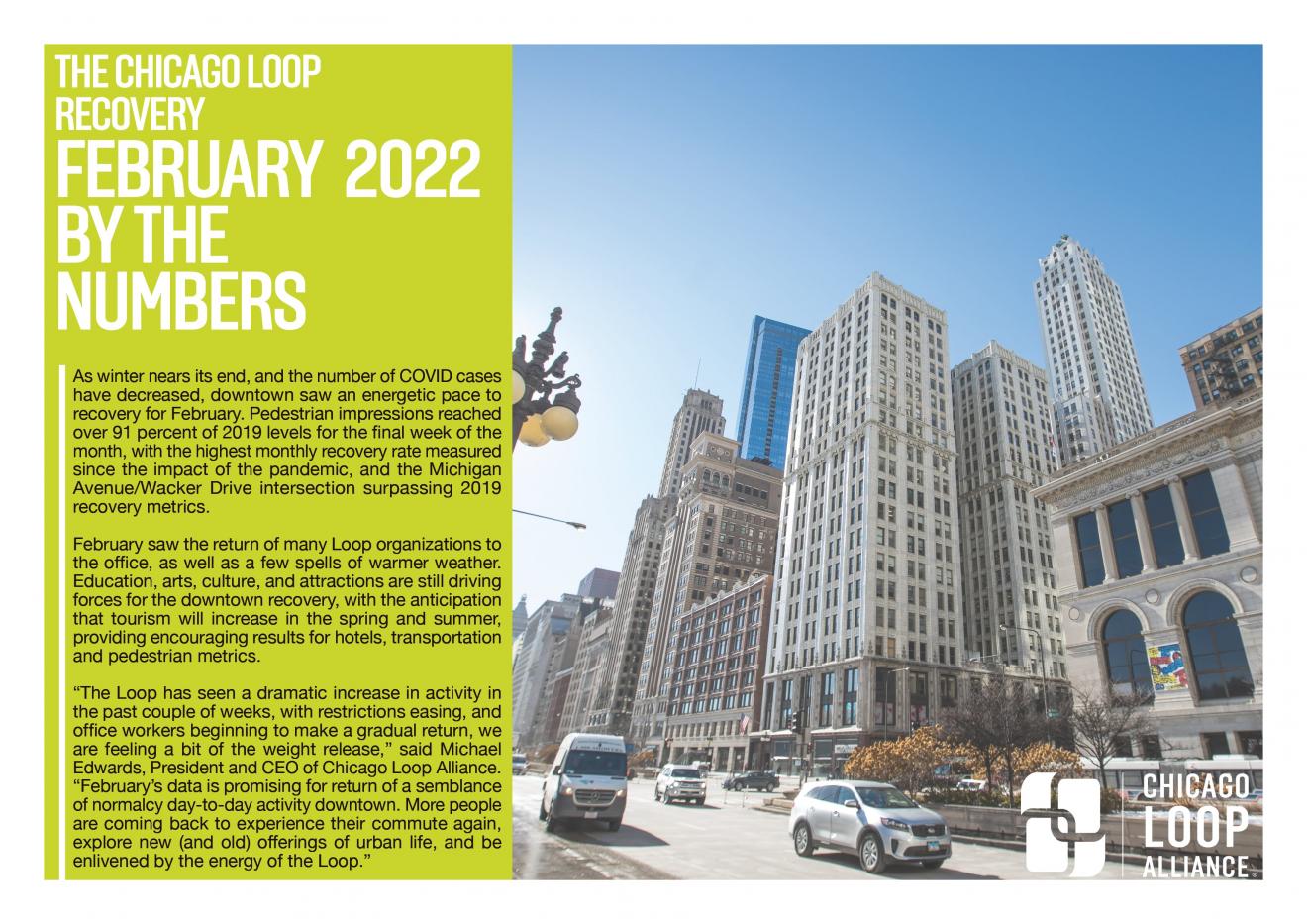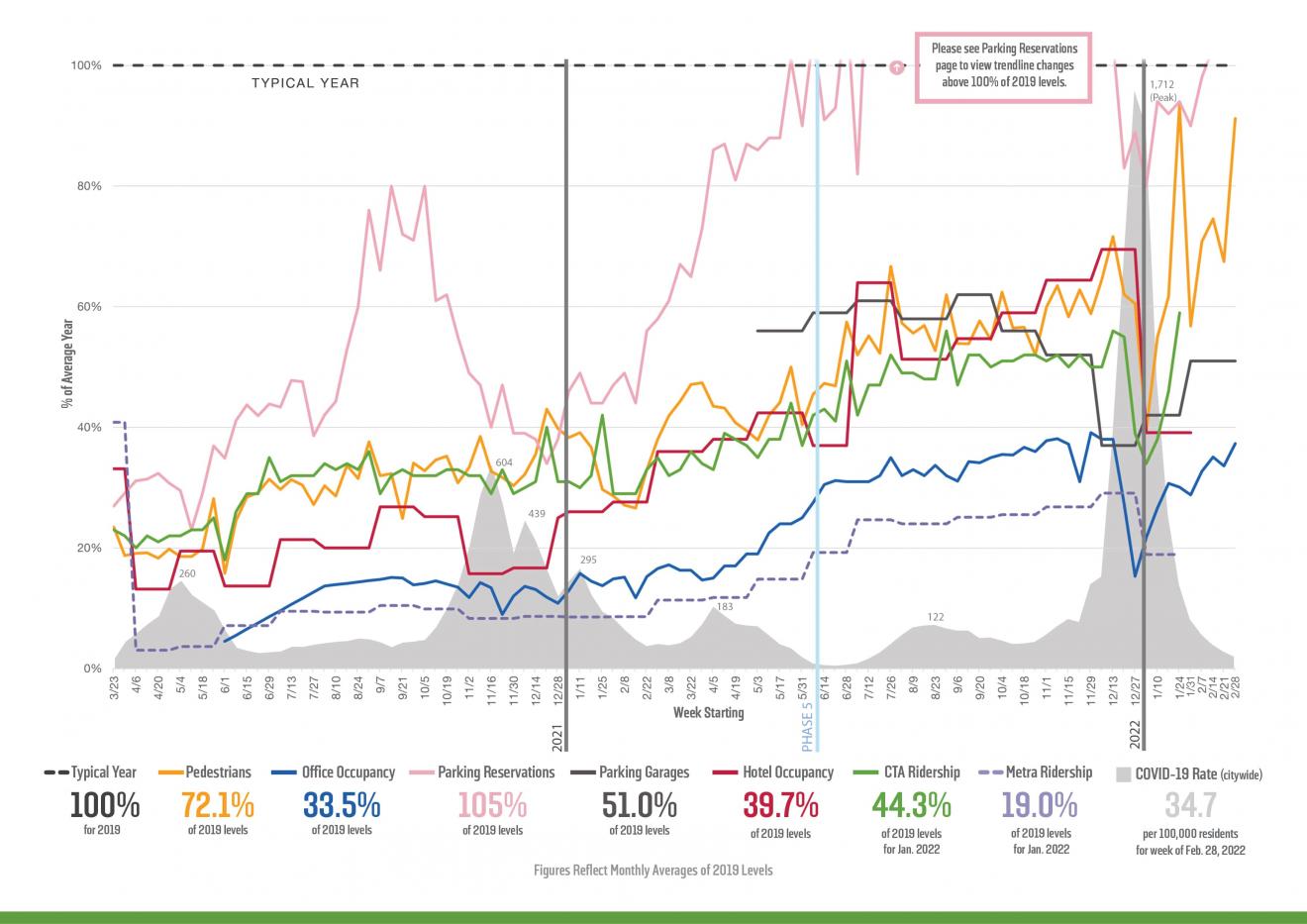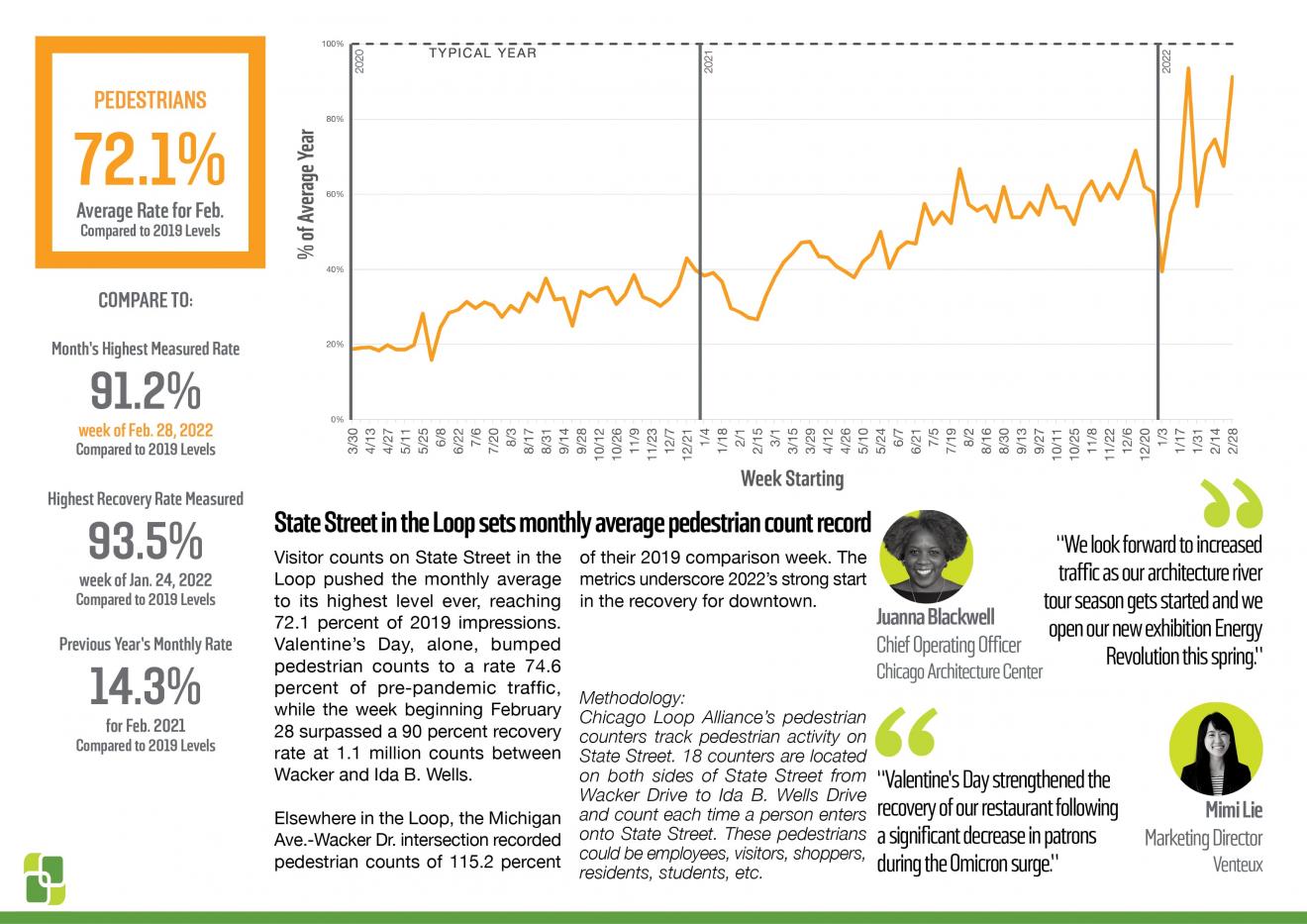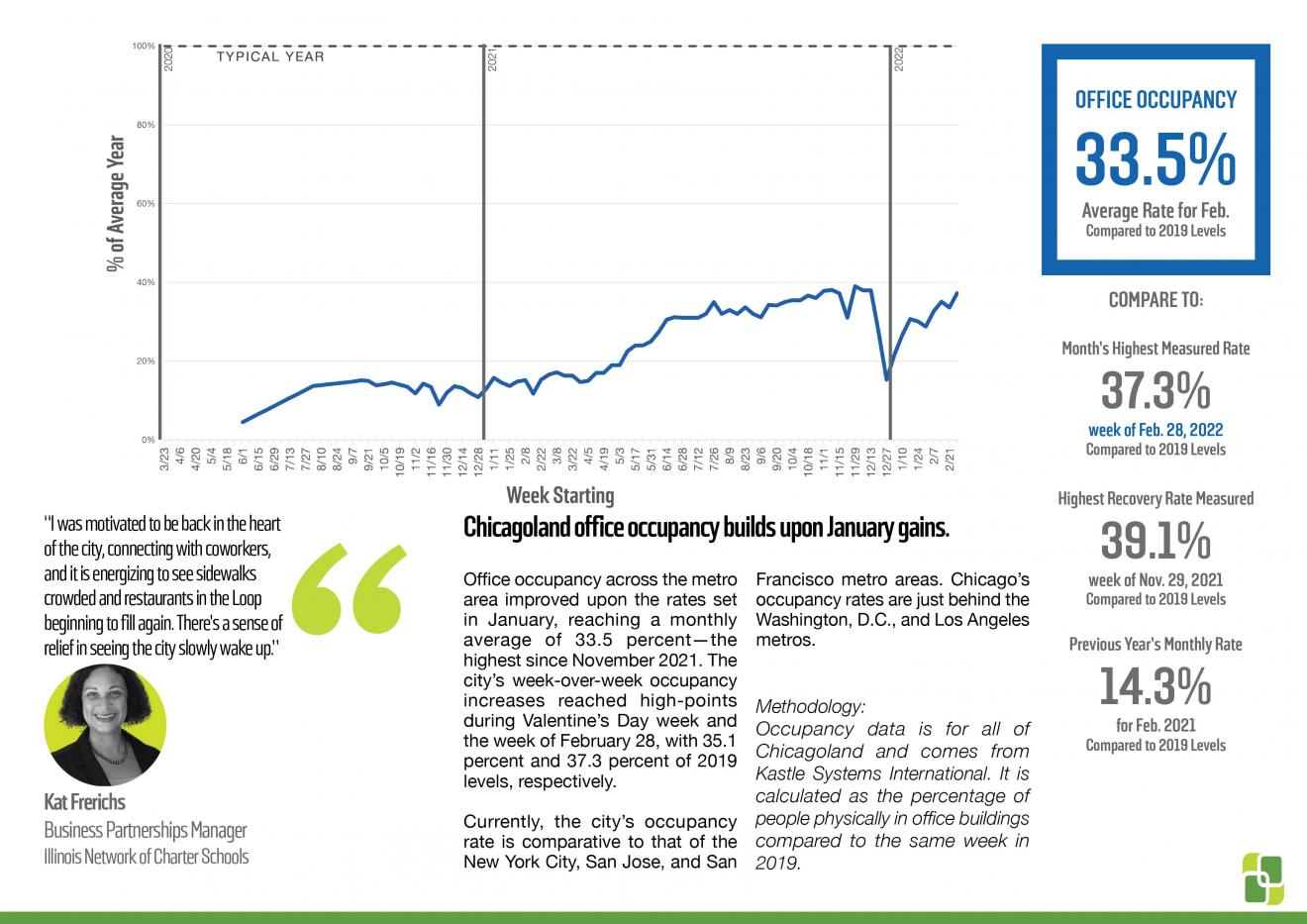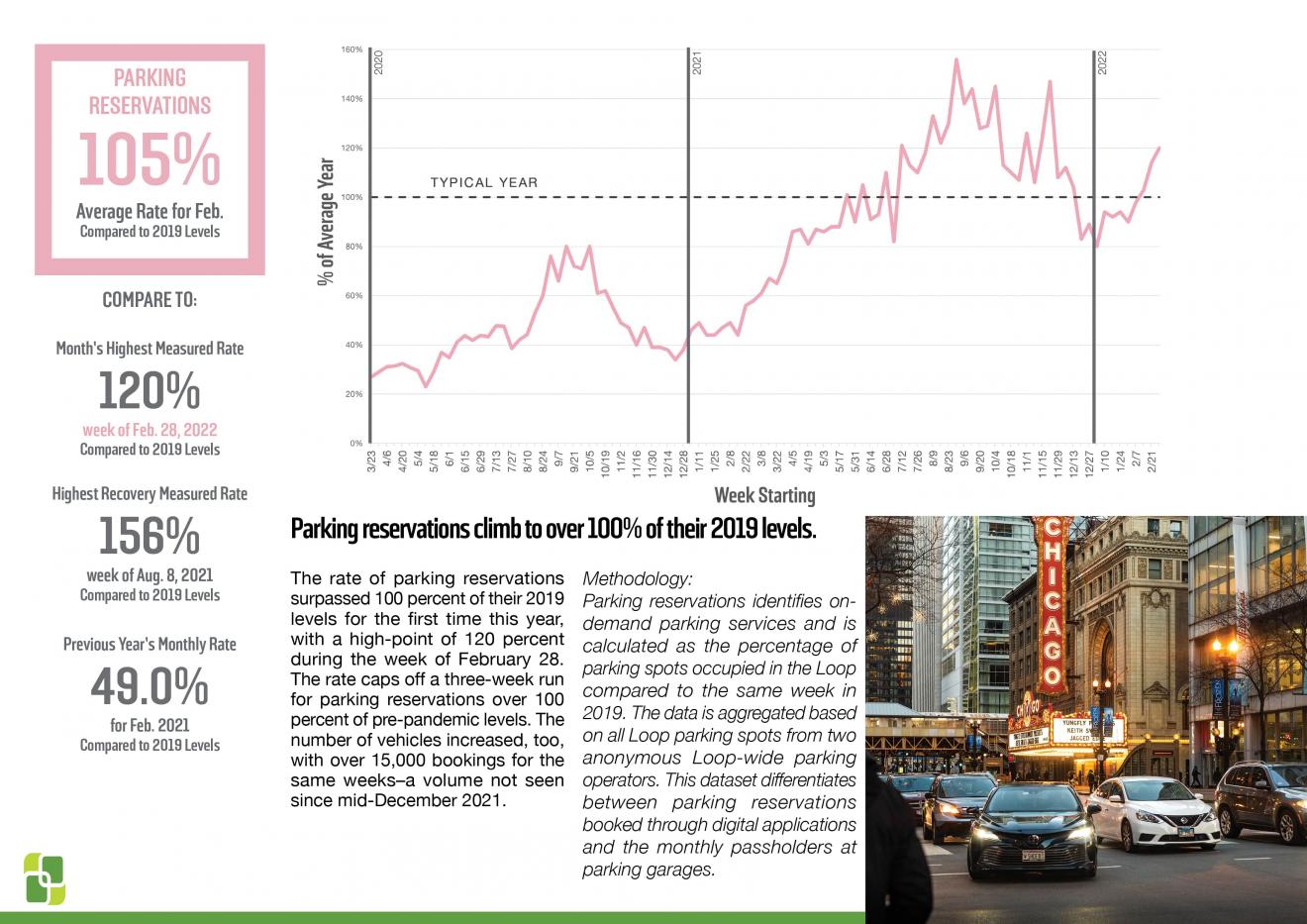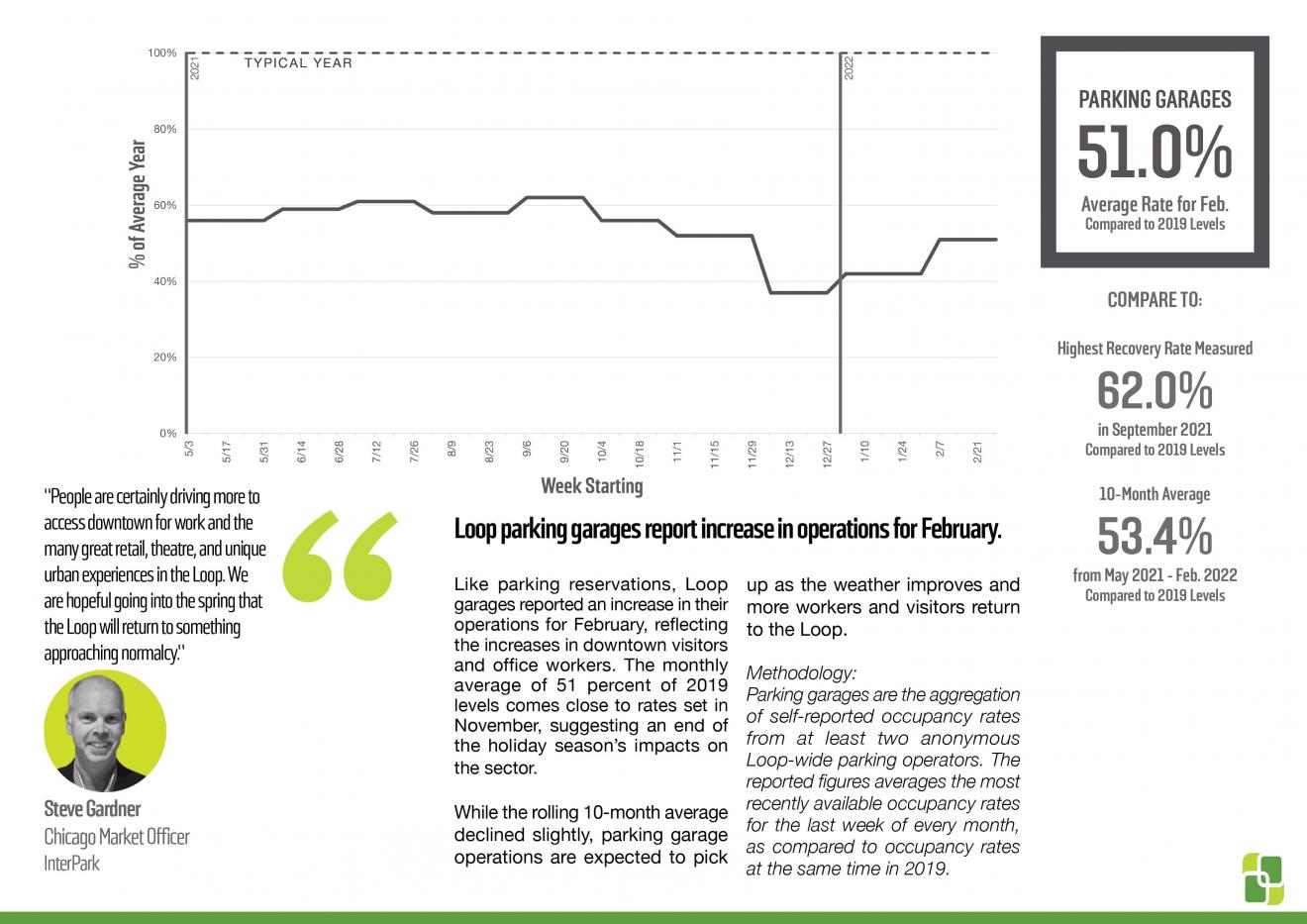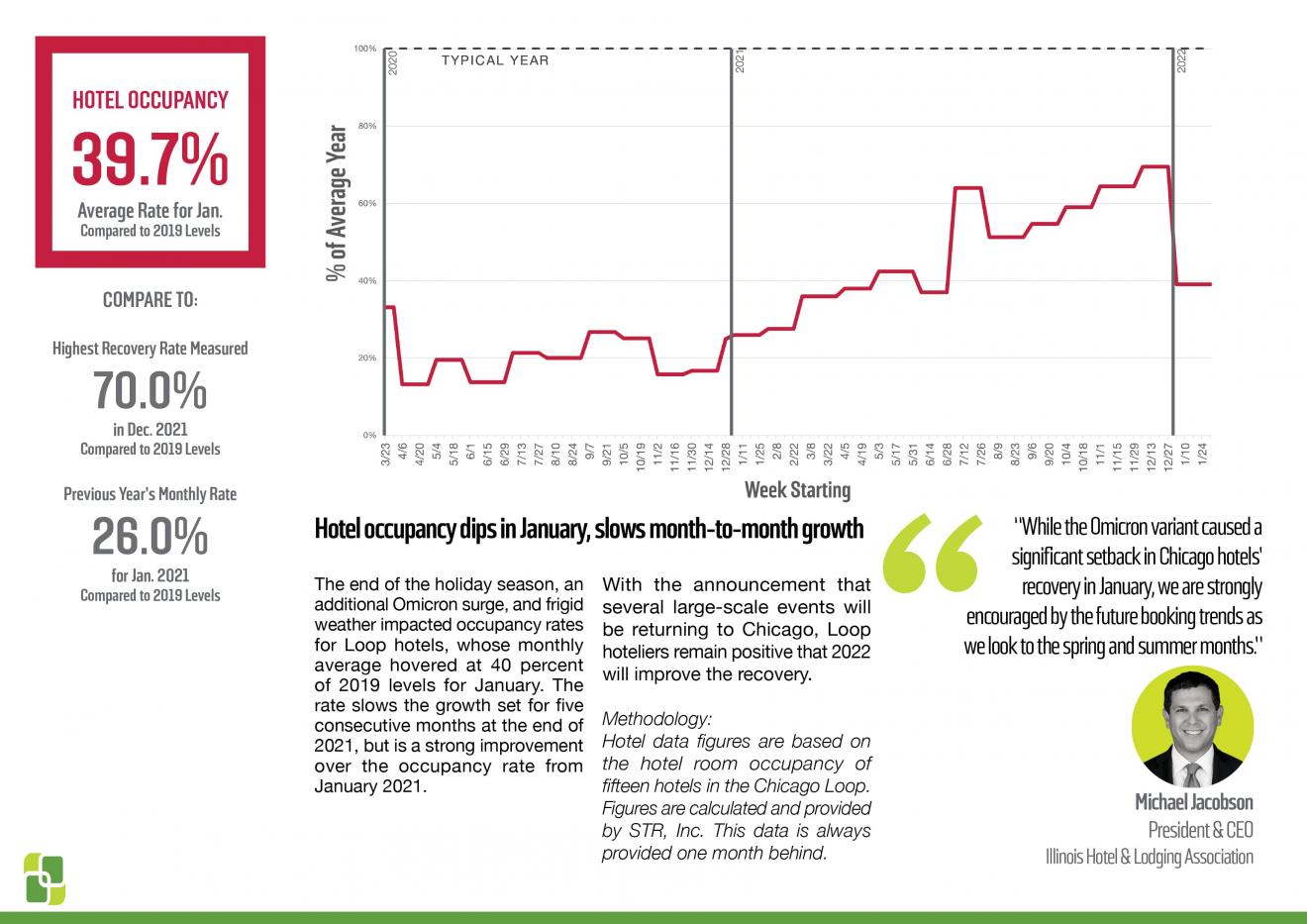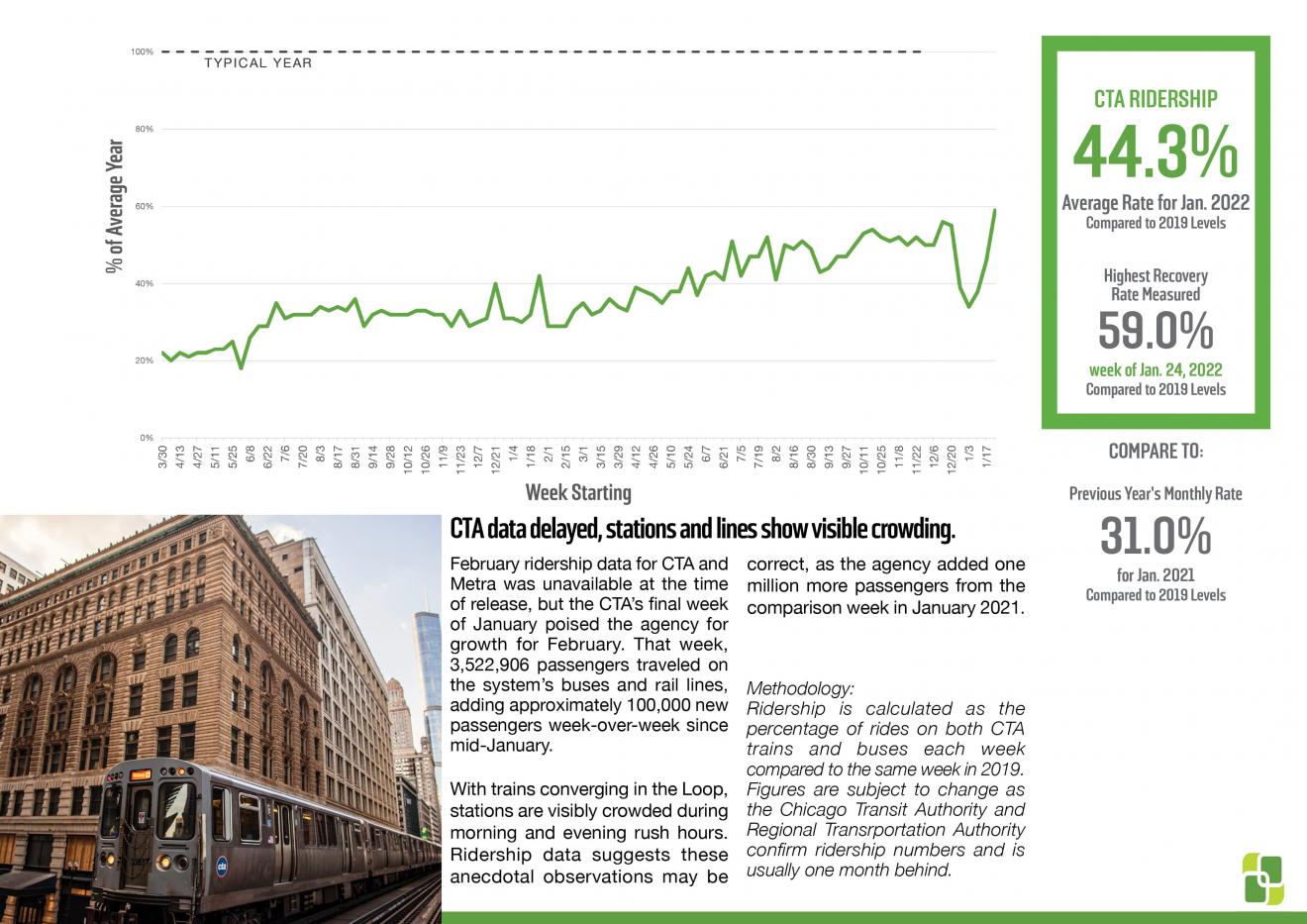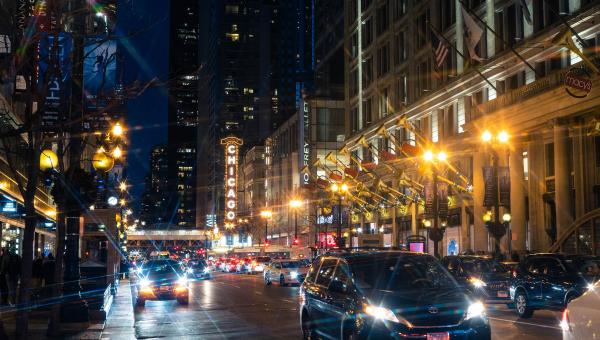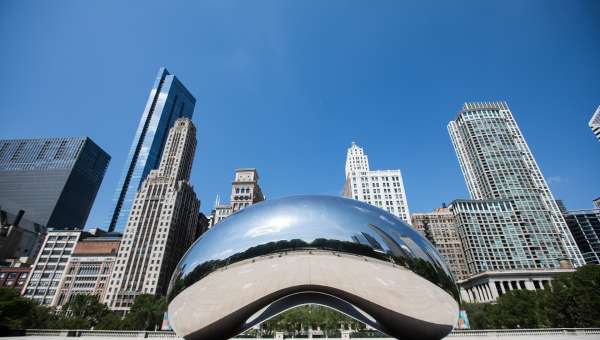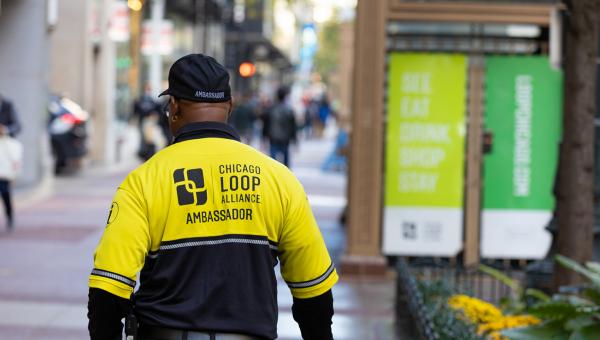Posted 4 years ago
5 MIN READ – Chicago Loop Alliance (CLA) released its February report on downtown activity, using a variety of data sources to track operations during COVID-19, as it has done monthly since July 2020. The report tracks COVID-19 positivity rates, pedestrian activity, parking volumes, hotel occupancy, number of office workers on-site and more. The data indicates that February pedestrian levels reached closest to pre-pandemic levels than ever before and in some instances exceeded 2019. Office occupancy rivaled other metro areas; and parking exceeded pandemic recovery rates when compared to the same period in 2019. View the full February report here.
As winter nears its end, and the number of COVID cases have decreased, downtown saw an energetic pace to recovery for February. Pedestrian impressions reached over 91 percent of 2019 levels for the final week of the month, with the highest monthly recovery rate measured since the impact of the pandemic, and the Michigan Avenue/Wacker Drive intersection surpassed 2019 recovery metrics.
February saw the return of many Loop organizations to the office, as well as a few spells of warmer weather. Education, arts, culture, and attractions still contributed as driving forces for the downtown recovery, with the anticipation that tourism will increase in the spring and summer, providing encouraging results for hotels, transportation and pedestrian metrics.
“The Loop has seen a dramatic increase in activity in the past couple of weeks, with restrictions easing, and office workers beginning to make a gradual return, we are feeling a bit of the weight release,” said Michael Edwards, President and CEO of Chicago Loop Alliance. “February’s data is promising for return of a semblance of normalcy day-to-day activity downtown. More people are coming back to experience their commute again, explore new (and old) offerings of urban life, and be enlivened by the energy of the Loop.”
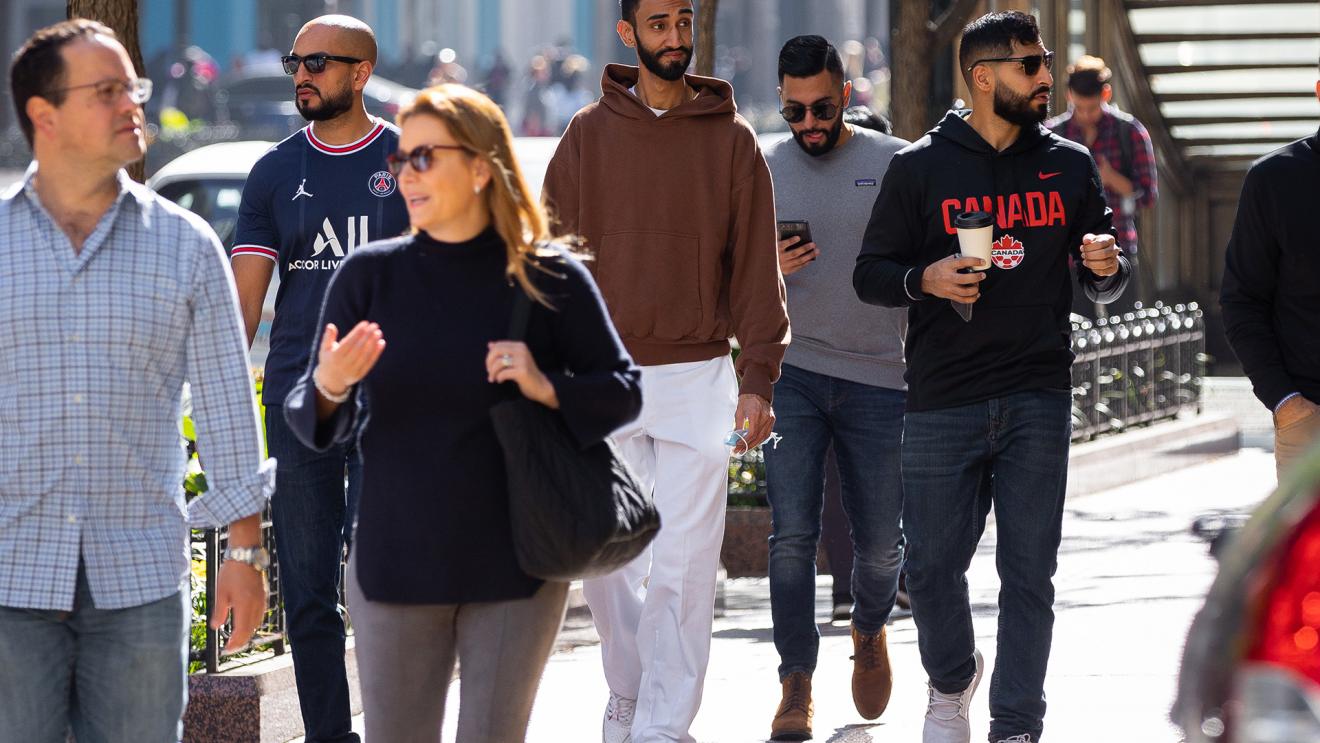
Pedestrian activity
Visitor counts in the Loop pushed the monthly average to its highest level ever, reaching 72.1 percent of 2019 impressions. Valentine’s Day, alone, bumped pedestrian counts to a rate 74.6 percent of pre-pandemic traffic, and the week beginning February 28 surpassed a 90 percent recovery rate with over one million counts on State Street in the Loop between Wacker and Ida B. Wells Drive.
Elsewhere in the Loop, the Michigan Avenue-Wacker Drive intersection recorded pedestrian counts of 115.2 percent of their 2019 comparison week. The metrics underscore 2022’s strong start in the recovery for downtown.
“The Chicago Architecture Center is excited about the strong return of visitors and workers to the Loop. We’ve already seen great signs of this with our sold-out Girls Build! Day festival welcoming over 250 people to our Center on St. Patrick’s Day weekend,” said Juanna Blackwell, Chief Operating Officer of Chicago Architecture Center. “We look forward to increased traffic as our architecture river tour season gets started, and we open our new exhibition Energy Revolution this spring.”
“Valentine’s Day strengthened the recovery of our restaurant following a significant decrease in patrons during the Omicron surge,” said Mimi Lie, Marketing Director of Venteux. “While our recovery is not quite at the levels we’d hope for, or have seen during the summer, we have definitely noticed strong business and foot traffic recently – especially during the weekends with warmer temperatures.”
Office occupancy
Office occupancy across the metro area improved upon the rates set in January, reaching a monthly average of 33.5 percent – the highest since November 2021. The city’s week-over-week occupancy increases reached high points during the week of Valentine’s Day and the week of February 28, with 35.1 percent and 37.3 percent of 2019 levels, respectively.
Currently, the city’s office occupancy rate is higher than that of the New York City, San Jose, and San Francisco metro areas. Chicago’s occupancy rates are just behind the Washington, D.C., and Los Angeles metros.
“I began my return to the office this month and have noticed fellow commuters making their way back downtown. Our team has returned to the office three days a week, with staggered schedules and requiring masking in some situations,” said Kat Frerichs, Business Partnerships Manager of Illinois Network of Charter Schools. “I was motivated to be back in the heart of the city, connecting with coworkers, and it is energizing to see the sidewalks crowded and restaurants in the Loop beginning to fill again. There a sense of relief in seeing the city slowly wake up.”
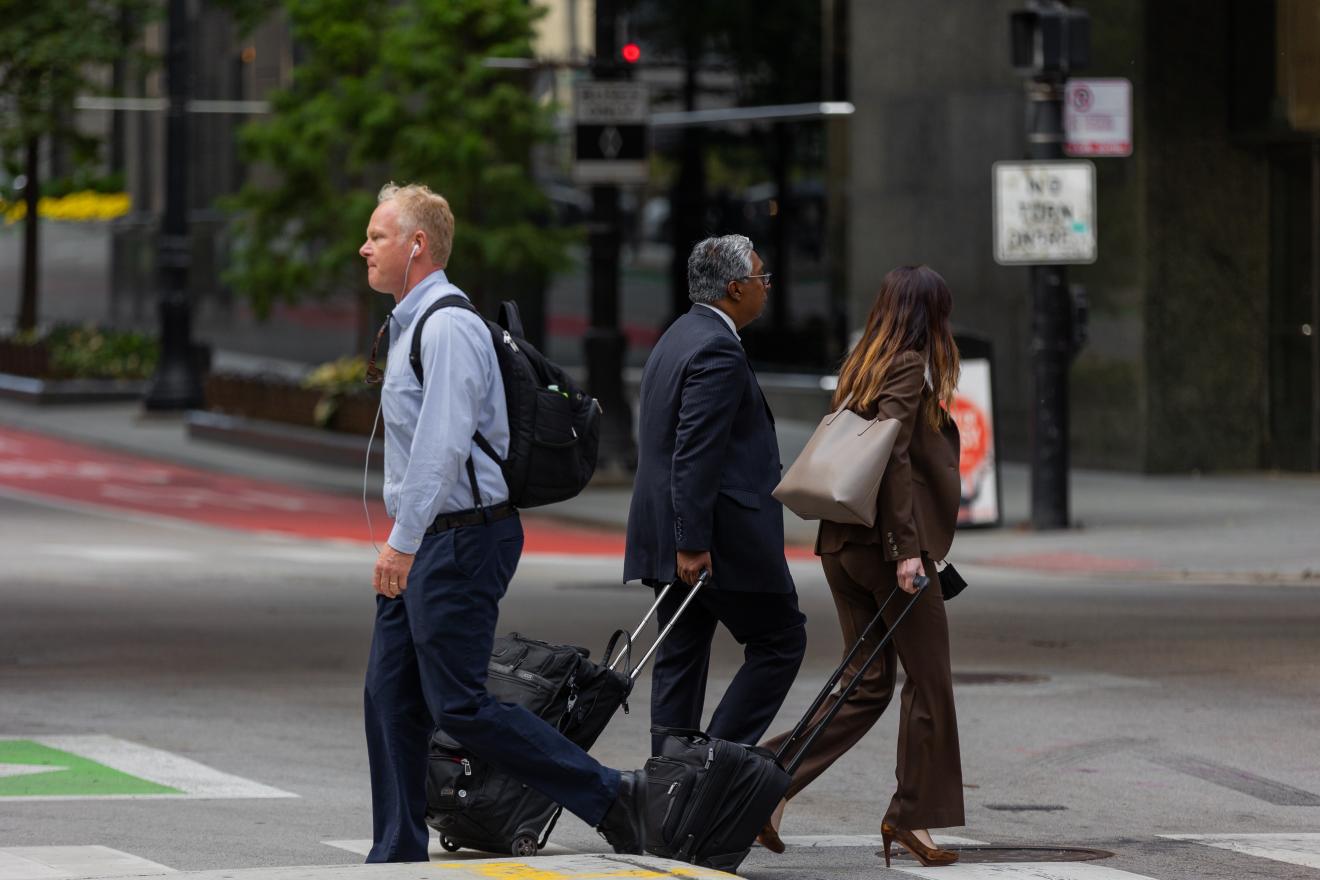
Parking reservations
The rate of parking reservations surpassed 100 percent of their 2019 levels for the first time this year, with a high point of 120 percent during the week of February 28. The rate caps off a three-week run for parking reservations over 100 percent of pre-pandemic levels. The number of vehicles also increased, with over 15,000 bookings for the same week – a volume not seen since mid-December 2021.
Parking garages
Like parking reservations, Loop garages reported an increase in their operations for February, reflecting the increases in downtown visitors and office workers. The monthly average of 51 percent of 2019 levels comes close to rates set in November, suggesting an end of the holiday season’s impacts on the sector.
While the rolling ten-month average declined slightly, parking garage operations are expected to pick up as the weather improves, and more workers and visitors return to the Loop.
“We were noticing a general increase through February but, saw a 10 percent spike in parking volumes during the first week of March,” said Steve Gardner, Vice President of Operations of InterPark. “People are certainly driving more to access downtown for work and the many great retail, theatre, and unique urban experiences in the Loop. We are hopeful going into the spring that the Loop will return to something approaching normalcy.”
Hotel occupancy
The end of the holiday season, an additional Omicron surge, and frigid weather impacted occupancy rates for Loop hotels, whose monthly average hovered at 40 percent of 2019 levels for January. The rate slows the growth set for five consecutive months at the end of 2021 but is a strong improvement over the occupancy rate from January 2021.
With the announcement that several large-scale events will be returning to Chicago, Loop hoteliers remain positive that 2022 will be a good year for recovery.
“While the Omicron variant caused a significant setback in Chicago hotels’ recovery in January, we are strongly encouraged by the future booking trends as we look to the spring and summer months,” said Michael Jacobson, President and CEO of Illinois Hotel and Lodging Association.
CTA ridership
February ridership data for CTA and Metra was unavailable at the time of release, but the CTA’s final week of January poised the agency for growth in February. That week, 3,522,906 passengers traveled on the system’s buses and rail lines, adding approximately 100,000 new passengers week-over-week since mid-January.
With trains converging in the Loop, stations are visibly crowded during morning and evening rush hours. Ridership data suggest these anecdotal observations may be correct, as the agency added one million more passengers from the comparison week in January 2021.
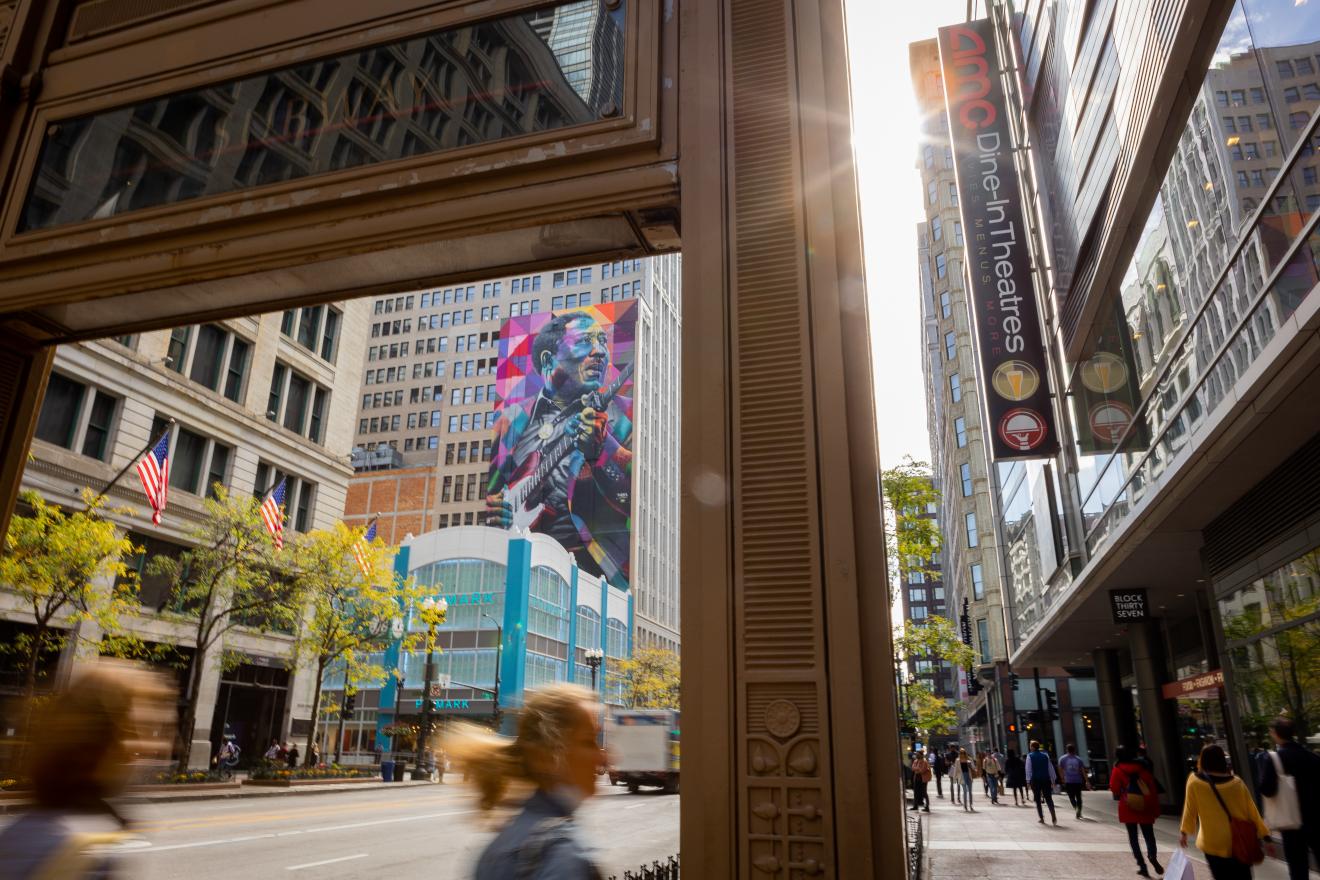
For those Loop workers who continue to return downtown, Chicago Loop Alliance has created a Back to Work Toolkit that can be found at LoopChicago.com/BackToWork. The toolkit includes insider tips for working downtown in the Loop for those who never left, as well as those who are returning for the first time. Find useful information on how to safely get downtown; what’s new in the Loop; what the Loop looks like these days; lunch and happy hour spots; and more.
Chicago Loop Alliance invites people to share their experiences downtown on social media using #BackInTheLoop.

